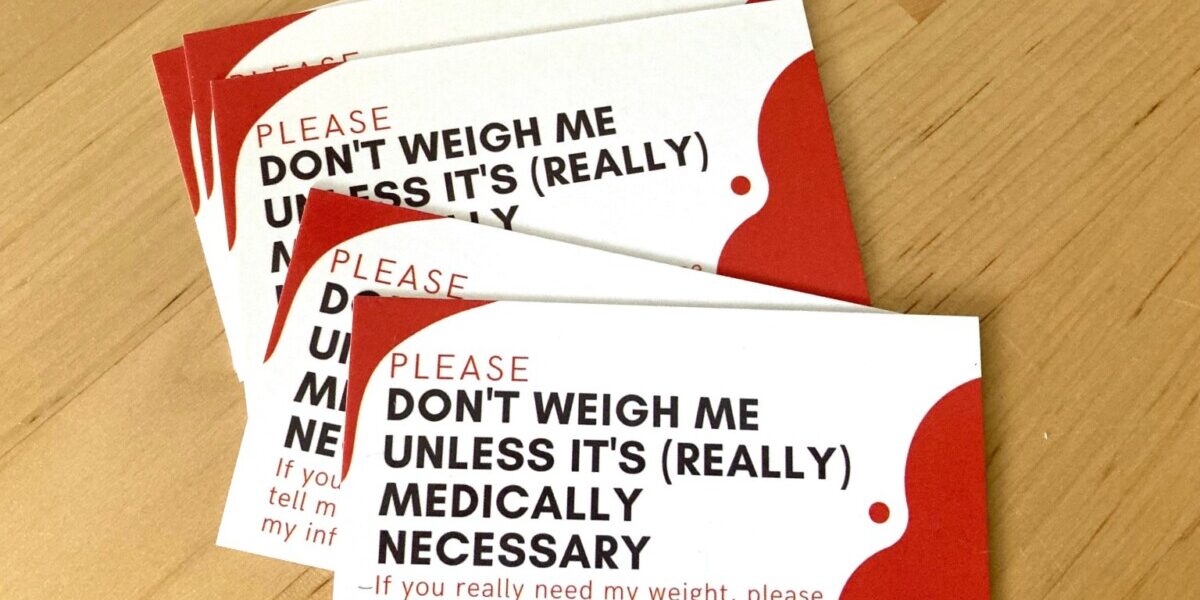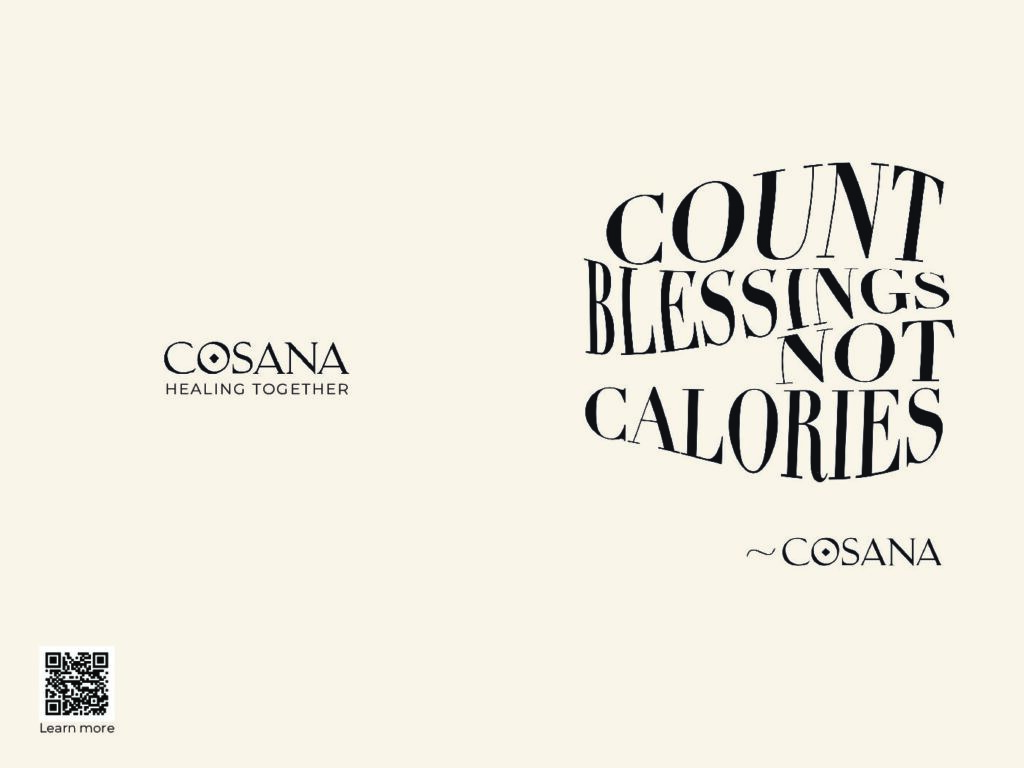“Don’t Weigh Me” Cards

Have you ever felt nervous about being weighed at the doctor’s, fearful of what the number would be or what the provider would say about your weight? Have you ever taken extra care to remove everything from your pockets that could add even a little extra weight? Or abstained from eating a meal before your appointment because you knew you would be asked to step on the scale? If the answer is yes to any of these questions, you’re not alone. For many individuals, being weighed can trigger stress and all kinds of negative judgments about one’s body, character, and worth. And here’s the thing: being weighed is rarely (really) medically necessary.
While doctors sometimes do need our weight, many times they don’t. Weighing patients is just part of the standard protocol (in the US, not globally), not because this metric is relevant or necessary, but because it’s a habit. Until recently, this practice has been left unquestioned. Now, patients are using “Don’t Weigh Me” cards during visits with their health care providers to encourage a more holistic assessment of health and wellbeing.
What are “Don’t Weigh Me” Cards?
 “Getting weighed is an informed choice that we get to make with our doctor. We don’t automatically have to step on the scale just because someone asks us to,” says Ginny Jones, founder of More-Love.org,2 a body-positivity organization. Ginny created these cards in an effort to support individuals in asserting their preferences and asking for informed consent before being weighed.
“Getting weighed is an informed choice that we get to make with our doctor. We don’t automatically have to step on the scale just because someone asks us to,” says Ginny Jones, founder of More-Love.org,2 a body-positivity organization. Ginny created these cards in an effort to support individuals in asserting their preferences and asking for informed consent before being weighed.
“Don’t Weigh Me” cards are a polite and respectful way to remind yourself, and your doctor, that it’s okay to not automatically step onto the scale when asked. The cards provide your doctor with a list of reasons why you might not want to be weighed. Reasons provided on the card invite your provider to evaluate whether they really need to know your weight. And if they do, the cards enable us to understand why and move forward from there.
How do “Don’t Weigh Me” cards help?
“Don’t Weigh Me” cards are helpful for both patients and health care providers.
- Reduce stress on the patient
- Protect patients from weight bias
- Remind providers that a person’s weight is just a small piece in the puzzle
- Serve as a vehicle for more meaningful and comprehensive discussion about health with provider
- Challenge the assumption that a person’s weight is an accurate indication of their health
- Support a “Health at Every Size” philosophy
But, if patients don’t get weighed, how will doctors be able to properly diagnose and assess health?
A person’s weight is not always an accurate measure to use for diagnosing or assessing health. For example, less than 6% of people with eating disorders are medically underweight.1 Many people fall within a “normal” or “healthy” weight range, but are engaged in dangerous behaviors, such as restricting and purging. In fact, this is how eating disorders go undiagnosed.
Weight Bias is a huge problem in the medical field
We live in a fatphobic society. Because of this, we make a lot of assumptions about people’s health based on their body size and weight. We tend to make positive assumptions about thin/muscular bodies (i.e. they are so fit, healthy, strong, disciplined, must eat so well) and negative assumptions about “bigger” bodies (i.e. they are unhealthy, lazy, lack discipline, eat junk food, don’t exercise). This is known as weight bias, and it is a huge problem in the medical field.
Studies show that health care providers maintain negative stereotypes about overweight patients, characterizing them as lacking willpower, self-control, or motivation to change, or as lazy and noncompliant. 3
Making such negative and demeaning assumptions about a patient’s health, character, and habits is not only unethical, but medically irresponsible. Doctors are led to disregard patient’s lived experiences, focus on the wrong health metrics, and recommend irrelevant treatments. It decreases the likelihood that a patient will receive a comprehensive and unbiased health evaluation, causing other undiscussed and untreated. Furthermore, it can be embarrassing, disempowering, and disorienting for the patient. And no human deserves to feel any of those things during a consultation with their health care provider.
Examples of when it might be medically necessary to weigh someone
While this is not an exhaustive list, here are a few examples of when it might be medically necessary to weigh a patient:
- Prescribing the proper dose of a medication
- Monitoring the health of a woman and her baby during pregnancy
- Tracking life threatening conditions like kidney failure and congestive heart failure
- In the early stages of eating disorder recovery
Who needs these cards?
While plenty of people are perfectly comfortable with getting weighed at the doctor’s office, this practice can be extremely stress-provoking for individuals who have or had eating disorders or disordered eating and for people who feel discriminated against on the basis of weight. These cards were created to support them in protecting their mental health and ensure they still receive appropriate medical care.
A big part of eating disorder recovery is learning to detach one’s worth from one’s weight. Stepping on the scale at the doctor can feel invalidating to one’s progress in recovery, trigger disordered thoughts and behaviors, and cause unnecessary anxiety. A patient’s mental health should be honored and valued. If the patient does not want to be weighed for mental health reasons, and it is not medically necessary, there are other measures the provider can use to assess physical wellness.
How can you get these cards?
You can get these cards from More-Love.org/free-dont-weigh-me-cards, but you don’t need a card to talk to your doctor about skipping the scale. All you have to do is ask.
Sources
- National Association of Anorexia Nervosa and Associated Disorders. (2021, November 3). Eating disorder statistics.
- More-Love.org. (2021, December 24). “Don’t weigh me” cards.
- Poustchi, Y., Saks, N. S., Piasecki, A. K., Hahn, K. A., & Ferrante, J. M. (2013). Brief intervention effective in reducing weight bias in medical students. Family medicine, 45(5), 345–348.
Disclaimer
I am not a licensed medical professional and this blog is not intended to be a substitute for professional medical advice. If users need medical or health advice, they should consult a doctor or other appropriate medical professional.
Share this article



